‘The legacy we leave behind’: Senator Ngo retires from the Senate

Diplomat, refugee, schoolteacher, citizenship judge. Senator Thanh Hai Ngo has lived all these lives and a few more besides in a career that took him to great heights in Canada — but that cost him a life in his native Vietnam. Ahead of his retirement on January 3, 2022, SenCAplus sat down with Senator Ngo for a discussion about his life, his contributions to Canada and the legacy he leaves behind.
You were born in Vietnam in 1947 and worked in the South during some very dark times. How did you end up in Canada?
In 1973 I was posted as a diplomat for the Republic of Vietnam in Bangkok, Thailand. I was a press attaché and the political bureau chief. In 1975, when the Viet Cong took over, I became persona non grata, so I had to leave.
Various countries accepted me, some even offered me a job. But in the end, I chose Canada because during my diplomatic post in Bangkok, I worked very closely with the Canadian embassy and the chargé d’affaires said, “Why don’t you come to Canada?”
He said, “If you come to Canada, you can go to work skating on the canal.” I said, “What? Skating on the canal?! Canada must be very cold.” I had no clue!
But he mentioned one thing that I really appreciated: “You are bilingual, so if you come to Canada you can use your knowledge and it’s going to be very easy to get a job.” He suggested I go to Ottawa.
I came to Ottawa in 1975. The 27th of May, 1975. Three o’clock in the morning at the Ottawa airport. An immigration officer was supposed to wait for us there but because it was 3 a.m., no one was there. So I took a cab with my wife and two kids — two years old and six months old — and said, “Just take us to any hotel, I don’t care.” You know what hotel they took us to? The Château Laurier. The next day I went to the immigration officer to do the paperwork.
You were a diplomat. You spoke French and English. You’d even studied at the Sorbonne in Paris — was it relatively easy to find work?
When I applied for jobs wherever I went, they said, “Sorry, sir, you’re overqualified.” Or, “No, you don’t have Canadian experience.” And I told them, “if you don’t hire me, how do I get Canadian experience?”
But the most important one I heard was very sad: “Oh, there’s another immigrant who has come here to take Canadians’ jobs.” That’s really, really bad. But as a refugee, you don’t take that one seriously.
Finally, I went to the Ministry of Education — they asked me to take a few courses, they tested me on my French language and they issued me an interim teaching certificate. I started teaching in 1976 until I retired in 2003-4.
Your retirement doesn’t seem to have lasted, because you then started to adjudicate employment insurance (EI) eligibility claims for workers whose initial application had been rejected.
I was appointed chair of the Ontario Board of Insurance Referees. You have one representative for the worker and one for the government, and I listened and gave my input. You have to know the rules and the law of EI and you have to understand the situations — each person has a different case. The idea is to listen, because the applicant doesn’t have any chance to speak to anyone except the officer of the government. You have to see the human side.
And then you became a citizenship judge — until you got a special phone call. How did you come to the prime minister’s attention?
At that time, I was very much involved with the Vietnamese community. I was president of the Vietnamese Community of Ottawa-Hull, involved with refugees’ cases when they come here looking for jobs, helping them fill out applications, getting them to go to interviews and so on.
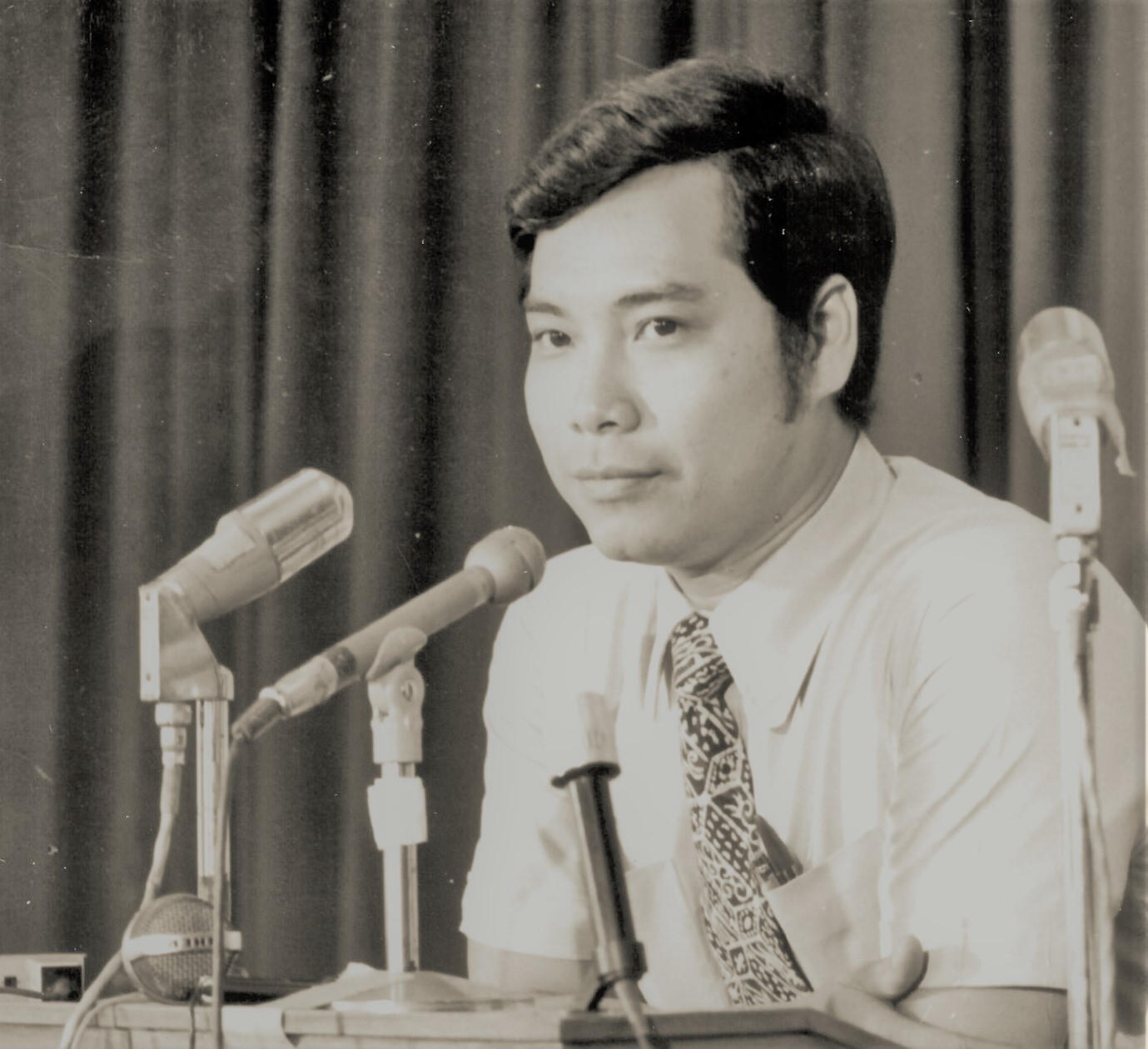
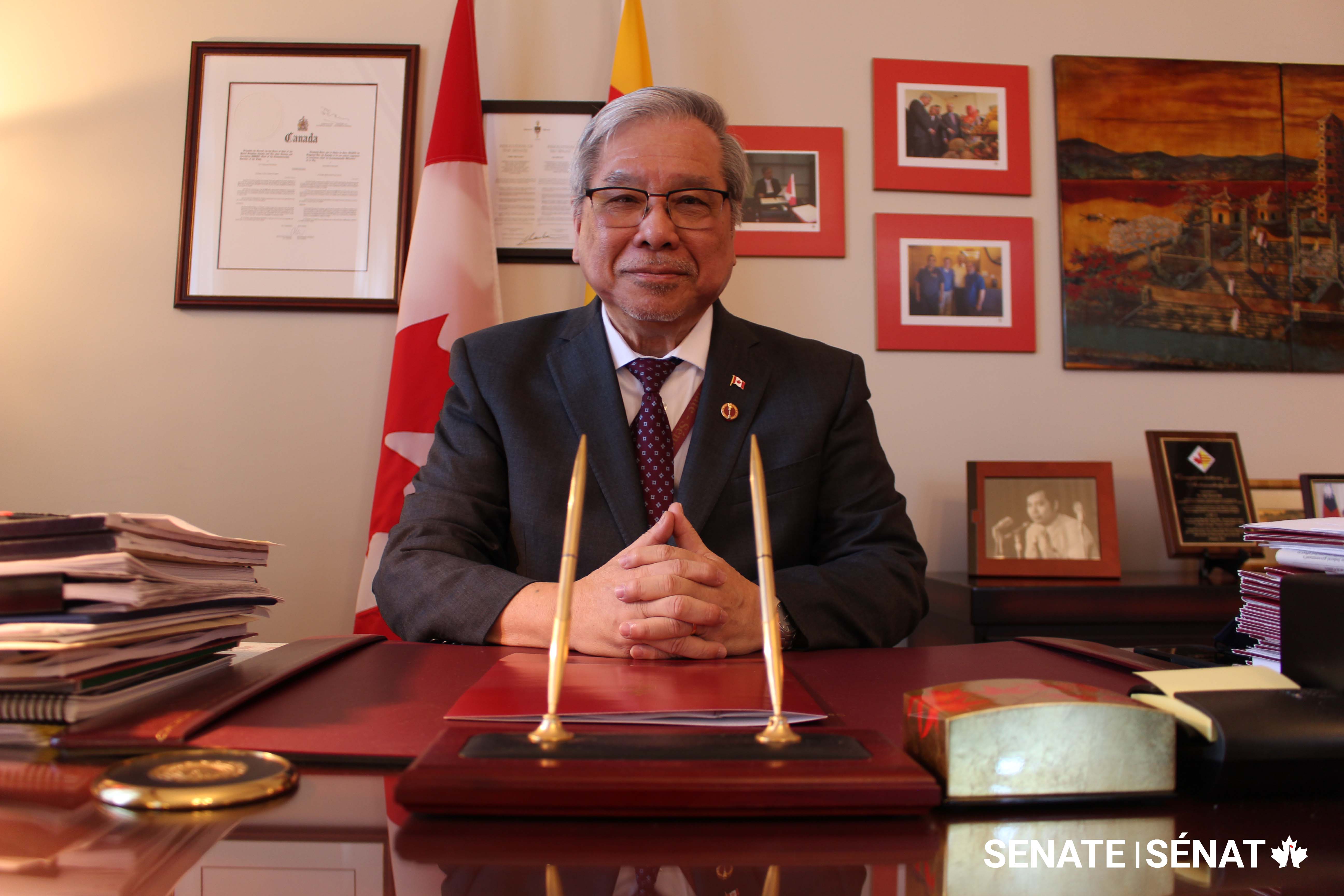
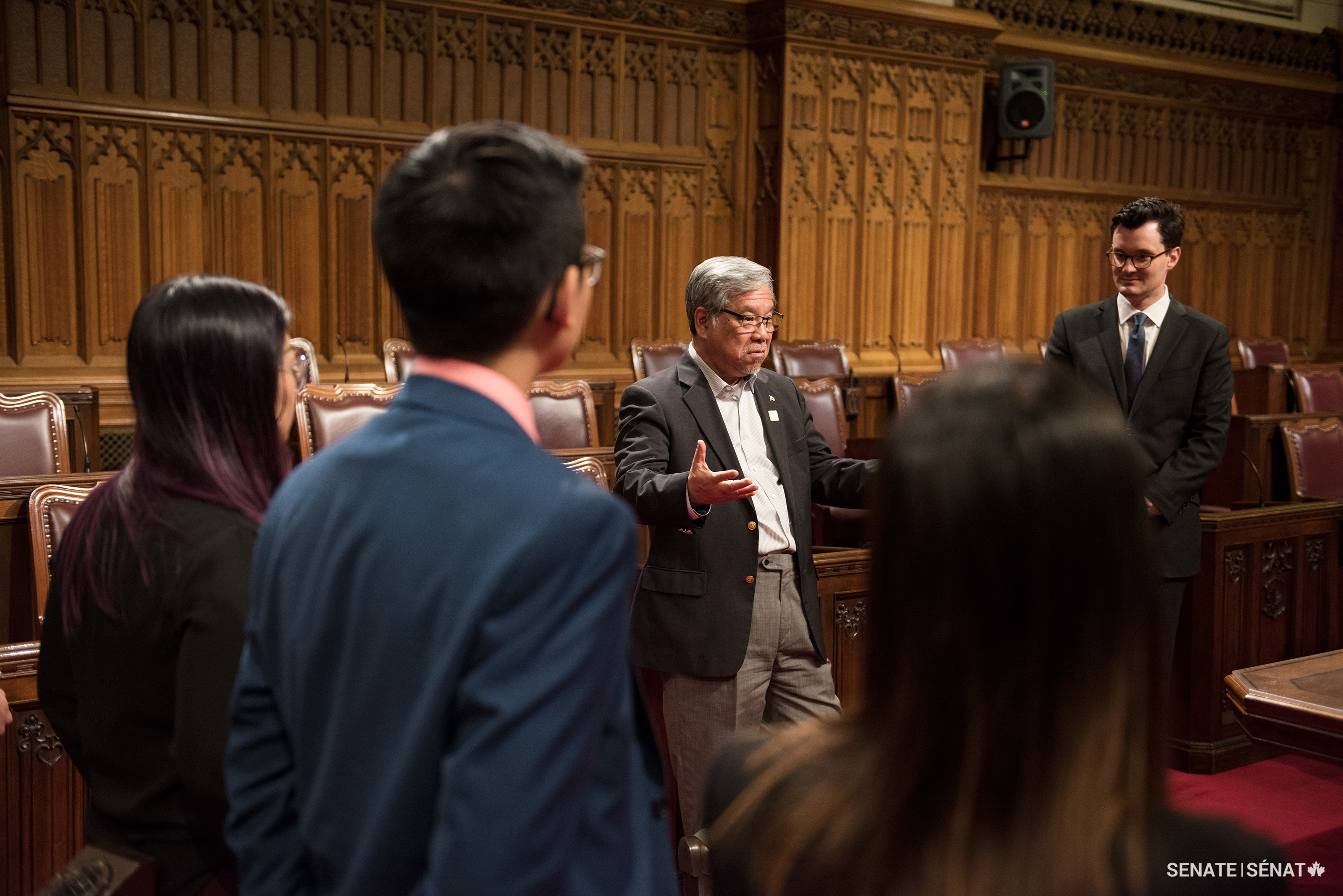
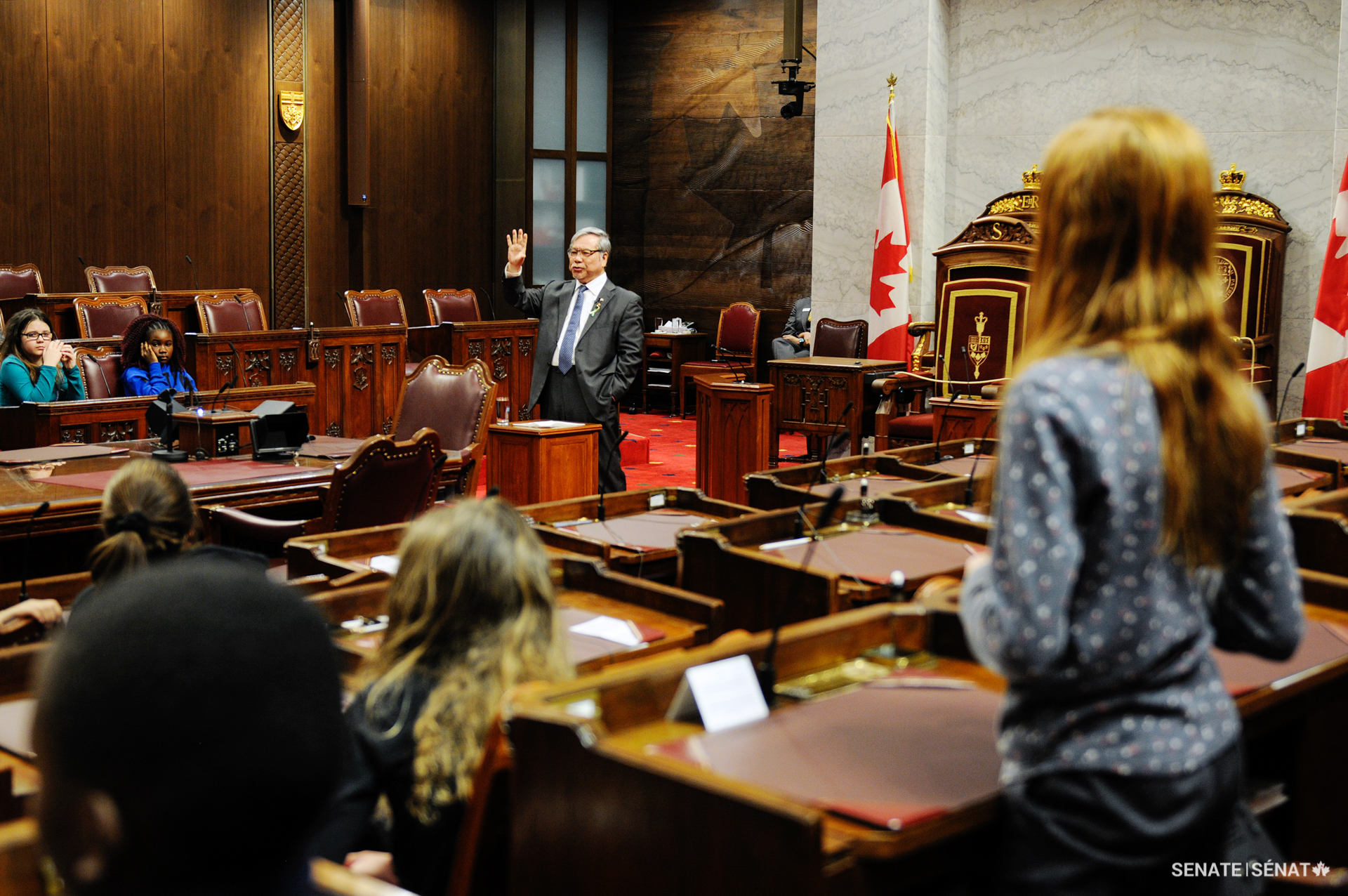
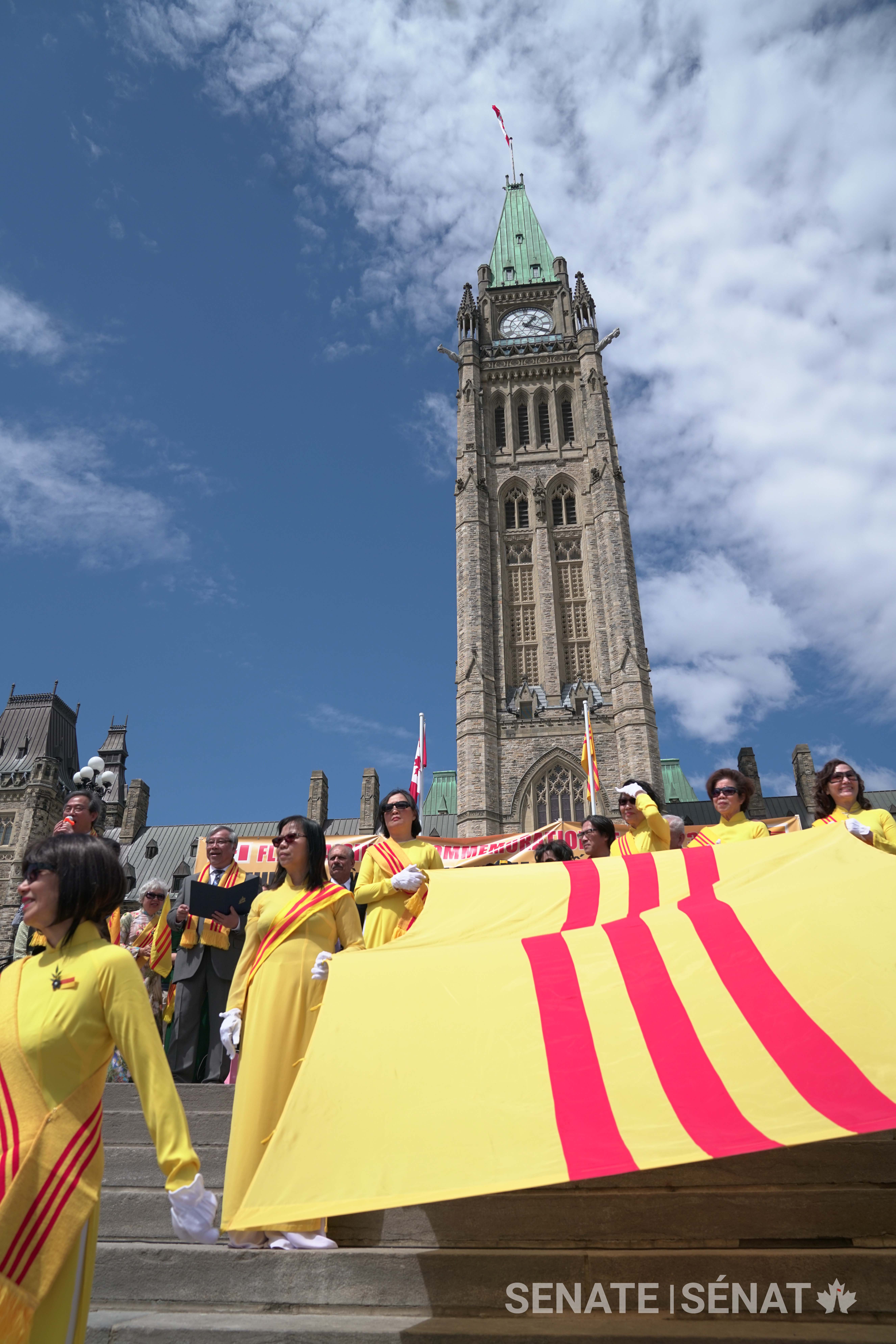
Not only that, I was also an advocate for democracy for the people in Vietnam as well. I was pretty well connected with the community. And because I worked a lot with MPs, I asked them to raise issues in Parliament regarding human rights violations in Vietnam and so on. MPs were also involved with the community; they attended our events and so on.
I sat there one day in the office on a Wednesday after I finished my first interview. I get a phone call from the deputy chief of staff of Prime Minister Stephen Harper. She said, “Judge Ngo?” I said, “Yes?” “The prime minister would like to speak to you in 10 minutes; are you ok, do you have time for that?”
Exactly at 11 o’clock — that’s what they said — they phoned. We just talked a bit about the weather and the prime minister said, “We know you’re involved with the community and you are an advocate for human rights and I would like to appoint you to the Senate — do you accept?”
I said, “Prime Minister, can I have time to think?” He said, “Yes, of course you have time to think — I’ll give you 15 minutes.”
I just phoned my wife and I talked to my senior judge. I get a phone call from the prime minister, I cannot say no!
Really — really — it’s an honour to do this. As a refugee, you come over here, you work your butt off, you have your principles — and if somebody recognizes your work and your principles and would like you to do something — I really can’t say no, especially to the prime minister. Then once you are in the Senate, you can see the work you’re doing is very rewarding and there you go — 10 years in the Senate.
Some of that work led to the passing of your Journey to Freedom Day Act in April 2015.
It recognizes the day Vietnamese refugees began to arrive in Canada after the fall of Saigon on April 30, 1975. To recognize the Canadian people who welcomed us with open arms and accepted us — at that time in the period of one year you had about 60,000 Vietnamese arrive here. That’s a lot.
We are thankful for their warm welcome to us. And that’s why now, the Vietnamese community, we are giving back. We are sponsoring the Syrians, the Afghans… We give back. We appreciate what Canadians did for us; it’s our turn to help.
You’ve never been back to Vietnam.
No.
The Senate got a lot of last-minute legislation and unfortunately you didn’t get to give your final speech in the Chamber. What were you going to say?
I had many people to thank. My Senate colleagues and everyone who supports our work, Prime Minister Harper for his confidence and trust, and of course my former and current staff.
But first and foremost, I wished to thank my wonderful family — my four children, Phuong, Thy, Uyen and Huy Gabriel, and my lovely grandchildren. And, most importantly, a very special thank you to my dear wife Hong Nga for her unwavering support and honest guidance.
We must cherish our diversity — the multifaceted and multicultural fabric that is Canadian society. We have to blend our culture with the Canadian fabric to make this country stronger. We must recognize the strength that lies in our differences, for it is thanks to this that we can innovate, learn from one another and grow.
In the wise words of Confucius, “To see what is right and not to do it is want of courage or of principle.” I have always done my best to remain true to my principles. For in the end, it is the legacy we leave behind that will remain.
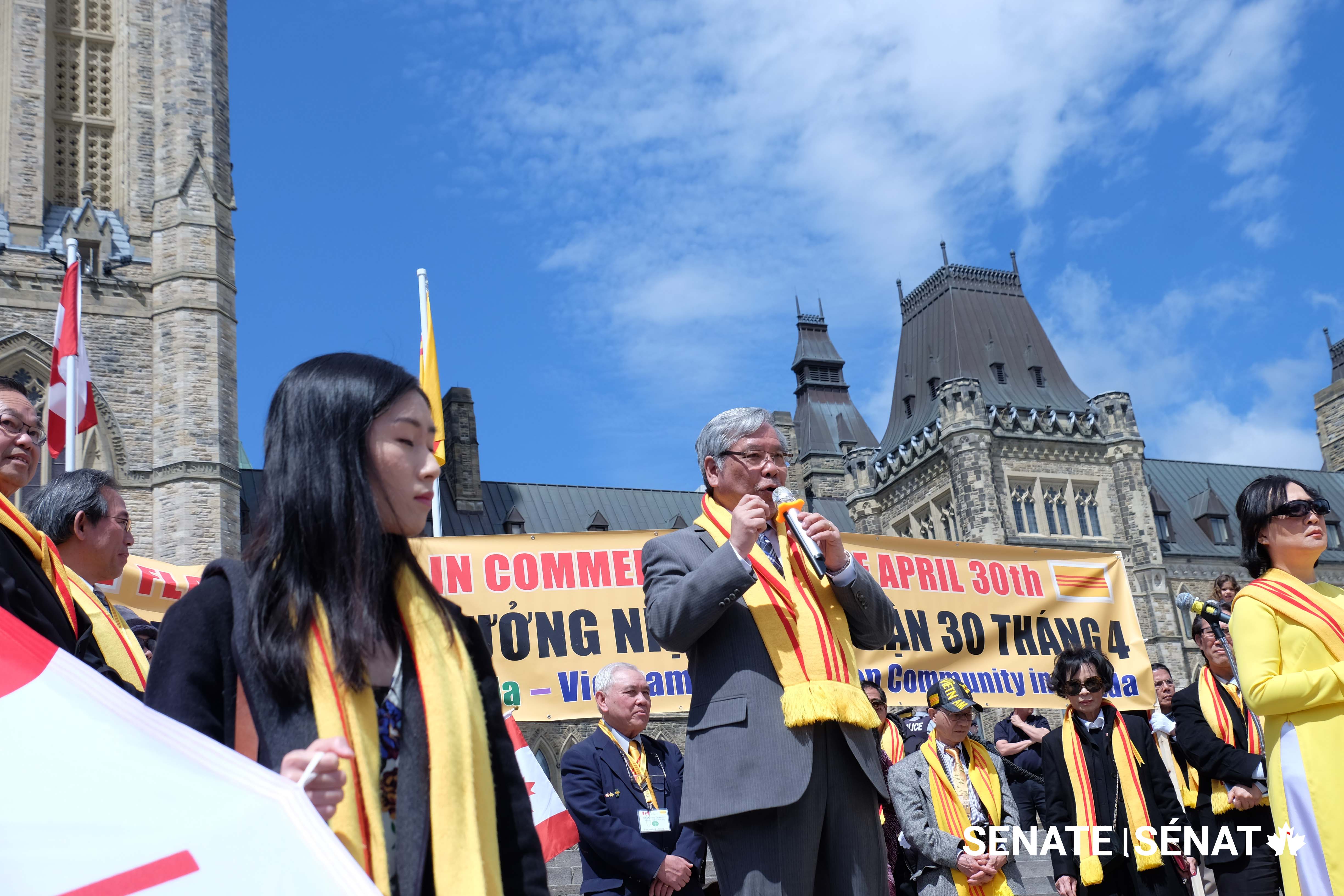
Related articles
Tags
Committee news
‘The legacy we leave behind’: Senator Ngo retires from the Senate

Diplomat, refugee, schoolteacher, citizenship judge. Senator Thanh Hai Ngo has lived all these lives and a few more besides in a career that took him to great heights in Canada — but that cost him a life in his native Vietnam. Ahead of his retirement on January 3, 2022, SenCAplus sat down with Senator Ngo for a discussion about his life, his contributions to Canada and the legacy he leaves behind.
You were born in Vietnam in 1947 and worked in the South during some very dark times. How did you end up in Canada?
In 1973 I was posted as a diplomat for the Republic of Vietnam in Bangkok, Thailand. I was a press attaché and the political bureau chief. In 1975, when the Viet Cong took over, I became persona non grata, so I had to leave.
Various countries accepted me, some even offered me a job. But in the end, I chose Canada because during my diplomatic post in Bangkok, I worked very closely with the Canadian embassy and the chargé d’affaires said, “Why don’t you come to Canada?”
He said, “If you come to Canada, you can go to work skating on the canal.” I said, “What? Skating on the canal?! Canada must be very cold.” I had no clue!
But he mentioned one thing that I really appreciated: “You are bilingual, so if you come to Canada you can use your knowledge and it’s going to be very easy to get a job.” He suggested I go to Ottawa.
I came to Ottawa in 1975. The 27th of May, 1975. Three o’clock in the morning at the Ottawa airport. An immigration officer was supposed to wait for us there but because it was 3 a.m., no one was there. So I took a cab with my wife and two kids — two years old and six months old — and said, “Just take us to any hotel, I don’t care.” You know what hotel they took us to? The Château Laurier. The next day I went to the immigration officer to do the paperwork.
You were a diplomat. You spoke French and English. You’d even studied at the Sorbonne in Paris — was it relatively easy to find work?
When I applied for jobs wherever I went, they said, “Sorry, sir, you’re overqualified.” Or, “No, you don’t have Canadian experience.” And I told them, “if you don’t hire me, how do I get Canadian experience?”
But the most important one I heard was very sad: “Oh, there’s another immigrant who has come here to take Canadians’ jobs.” That’s really, really bad. But as a refugee, you don’t take that one seriously.
Finally, I went to the Ministry of Education — they asked me to take a few courses, they tested me on my French language and they issued me an interim teaching certificate. I started teaching in 1976 until I retired in 2003-4.
Your retirement doesn’t seem to have lasted, because you then started to adjudicate employment insurance (EI) eligibility claims for workers whose initial application had been rejected.
I was appointed chair of the Ontario Board of Insurance Referees. You have one representative for the worker and one for the government, and I listened and gave my input. You have to know the rules and the law of EI and you have to understand the situations — each person has a different case. The idea is to listen, because the applicant doesn’t have any chance to speak to anyone except the officer of the government. You have to see the human side.
And then you became a citizenship judge — until you got a special phone call. How did you come to the prime minister’s attention?
At that time, I was very much involved with the Vietnamese community. I was president of the Vietnamese Community of Ottawa-Hull, involved with refugees’ cases when they come here looking for jobs, helping them fill out applications, getting them to go to interviews and so on.





Not only that, I was also an advocate for democracy for the people in Vietnam as well. I was pretty well connected with the community. And because I worked a lot with MPs, I asked them to raise issues in Parliament regarding human rights violations in Vietnam and so on. MPs were also involved with the community; they attended our events and so on.
I sat there one day in the office on a Wednesday after I finished my first interview. I get a phone call from the deputy chief of staff of Prime Minister Stephen Harper. She said, “Judge Ngo?” I said, “Yes?” “The prime minister would like to speak to you in 10 minutes; are you ok, do you have time for that?”
Exactly at 11 o’clock — that’s what they said — they phoned. We just talked a bit about the weather and the prime minister said, “We know you’re involved with the community and you are an advocate for human rights and I would like to appoint you to the Senate — do you accept?”
I said, “Prime Minister, can I have time to think?” He said, “Yes, of course you have time to think — I’ll give you 15 minutes.”
I just phoned my wife and I talked to my senior judge. I get a phone call from the prime minister, I cannot say no!
Really — really — it’s an honour to do this. As a refugee, you come over here, you work your butt off, you have your principles — and if somebody recognizes your work and your principles and would like you to do something — I really can’t say no, especially to the prime minister. Then once you are in the Senate, you can see the work you’re doing is very rewarding and there you go — 10 years in the Senate.
Some of that work led to the passing of your Journey to Freedom Day Act in April 2015.
It recognizes the day Vietnamese refugees began to arrive in Canada after the fall of Saigon on April 30, 1975. To recognize the Canadian people who welcomed us with open arms and accepted us — at that time in the period of one year you had about 60,000 Vietnamese arrive here. That’s a lot.
We are thankful for their warm welcome to us. And that’s why now, the Vietnamese community, we are giving back. We are sponsoring the Syrians, the Afghans… We give back. We appreciate what Canadians did for us; it’s our turn to help.
You’ve never been back to Vietnam.
No.
The Senate got a lot of last-minute legislation and unfortunately you didn’t get to give your final speech in the Chamber. What were you going to say?
I had many people to thank. My Senate colleagues and everyone who supports our work, Prime Minister Harper for his confidence and trust, and of course my former and current staff.
But first and foremost, I wished to thank my wonderful family — my four children, Phuong, Thy, Uyen and Huy Gabriel, and my lovely grandchildren. And, most importantly, a very special thank you to my dear wife Hong Nga for her unwavering support and honest guidance.
We must cherish our diversity — the multifaceted and multicultural fabric that is Canadian society. We have to blend our culture with the Canadian fabric to make this country stronger. We must recognize the strength that lies in our differences, for it is thanks to this that we can innovate, learn from one another and grow.
In the wise words of Confucius, “To see what is right and not to do it is want of courage or of principle.” I have always done my best to remain true to my principles. For in the end, it is the legacy we leave behind that will remain.



